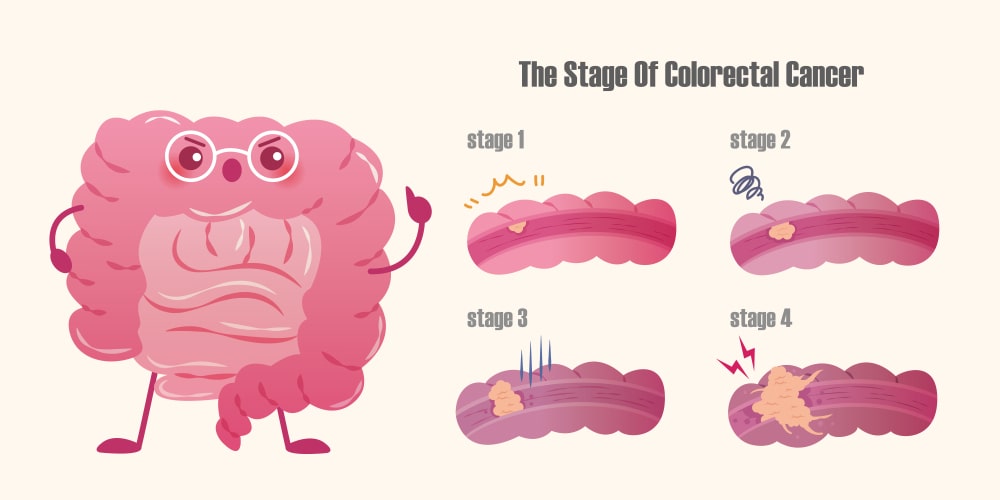Pioneer Woman: Understanding Colon Cancer Stage 4
Colon cancer, particularly in its advanced stages, is a critical health issue that affects many individuals and families. The term "Pioneer Woman" may evoke thoughts of resilience and strength, qualities that are essential for those battling severe illnesses like colon cancer. As we delve into this topic, we will explore the journey of those facing stage 4 colon cancer, the symptoms, treatments available, and personal stories that inspire hope.
The journey through colon cancer can be daunting, especially when diagnosed at stage 4, where the disease has spread beyond the colon to other parts of the body. Understanding the nuances of this condition not only empowers patients but also their loved ones, providing them with vital information to navigate through this challenging time. This article aims to shed light on stage 4 colon cancer while honoring the spirit of those who embody the essence of the "Pioneer Woman."
In this comprehensive guide, we will cover various aspects of colon cancer, including its symptoms, treatment options, and support systems available for patients and families. We will also share inspiring stories that highlight the journeys of individuals who have faced this diagnosis with courage and determination. Join us in understanding more about colon cancer and how we can support those affected by it.
Table of Contents
- What is Colon Cancer?
- Stages of Colon Cancer
- Understanding Stage 4 Colon Cancer
- Symptoms of Stage 4 Colon Cancer
- Treatment Options for Stage 4 Colon Cancer
- Personal Stories and Experiences
- Support Systems for Patients and Families
- Conclusion
What is Colon Cancer?
Colon cancer, or colorectal cancer, arises from the inner lining of the colon or rectum. It typically begins as small, benign growths called polyps that can become cancerous over time. Early detection through screenings can lead to a higher success rate in treatment and recovery. Factors such as age, family history, diet, and lifestyle can influence the risk of developing colon cancer.
Stages of Colon Cancer
Colon cancer is classified into stages ranging from 0 to 4:
- Stage 0: Carcinoma in situ; cancer cells are found only in the innermost lining of the colon.
- Stage 1: Cancer has grown into the inner layers of the colon but has not spread to nearby lymph nodes.
- Stage 2: Cancer has spread through the wall of the colon but not to nearby lymph nodes.
- Stage 3: Cancer has spread to nearby lymph nodes but not to distant sites.
- Stage 4: Cancer has spread to distant organs, such as the liver or lungs.
Understanding Stage 4 Colon Cancer
Stage 4 colon cancer is the most advanced stage, indicating that the cancer has metastasized, meaning it has spread to other parts of the body. This stage poses significant challenges in terms of treatment and management. Understanding the implications of this stage is crucial for patients and their families.
Statistics and Prognosis
According to the American Cancer Society, the 5-year survival rate for stage 4 colon cancer is approximately 14%. However, statistics can vary based on factors such as the patient's overall health, response to treatment, and the specific characteristics of the cancer.
Symptoms of Stage 4 Colon Cancer
Recognizing the symptoms of stage 4 colon cancer is vital for timely treatment. Common symptoms may include:
- Unexplained weight loss
- Persistent abdominal pain or discomfort
- Changes in bowel habits, such as diarrhea or constipation
- Blood in the stool
- Fatigue or weakness
- Jaundice (yellowing of the skin and eyes) if the liver is affected
Treatment Options for Stage 4 Colon Cancer
Treatment for stage 4 colon cancer typically involves a combination of therapies, including:
- Surgery: To remove tumors and, if possible, affected parts of the colon.
- Chemotherapy: Often used to kill cancer cells or slow their growth.
- Targeted therapy: Uses drugs that specifically target cancer cells with certain characteristics.
- Immunotherapy: Helps the immune system recognize and attack cancer cells.
Personal Stories and Experiences
Personal narratives can provide hope and motivation for those facing similar challenges. Many individuals diagnosed with stage 4 colon cancer have shared their experiences, resilience, and lessons learned along the way.
Inspirational Stories
For example, one survivor, Jane Doe, was diagnosed at age 55. Despite the grim prognosis, she sought multiple opinions, embraced a holistic approach to her treatment, and became an advocate for awareness and early detection.
Support Systems for Patients and Families
Support is crucial for those battling stage 4 colon cancer. Various resources are available, including:
- Support groups: Connecting with others facing similar struggles can provide comfort.
- Counseling services: Professional help can assist with emotional and psychological challenges.
- Online resources: Websites and forums dedicated to cancer support can offer valuable information and community.
Conclusion
In conclusion, understanding colon cancer, particularly at stage 4, is essential for patients and their families. While the journey may be challenging, knowledge, support, and personal stories can provide hope and direction. We encourage readers to share their experiences and support one another in this fight against cancer.
For those looking to learn more, consider leaving a comment, sharing this article with others, or exploring additional resources available on our site. Together, we can raise awareness and provide support to those affected by colon cancer.
Thank you for reading, and we hope to see you back soon for more informative articles!
Understanding The Gypsy Rose Mom Crime Scene: A Deep Dive Into A Complex Case
What Does Jasmine Crockett's Husband Do? Exploring The Life And Career Of Jasmine Crockett's Spouse
Gypsy Rose Mother Leaked Crime Scene Photos: A Deep Dive Into The Case


